I think they’re lacking explanation of what the data means.
This can be very nuanced, and dependent on your goals.
For example, in the context of fingerprinting, sometimes it’s better to provide fake data instead of no data, because that itself can be a unique characteristic.
I would have loved to see spoofed data added to the list, it’s a major component of libre wolf.
deleted by creator
I just run Firefox with uBlock Origin, but if I was real tinfoil hat about this stuff I would go for LibreWolf, or just the Tor Browser.
Brave bugs me because I don’t want my web browser to be a crypto wallet lol (also, the only cryptocurrency I actually have faith in is Monero).
Couldn’t agree more. I just wish there was an easy way to replicate Edge’s vertical tab implementation. I really like the way you can minimize the title and side bar so that you’re in an almost frameless window.
I’m also a proponent of running multiple browsers for different purposes. One with accounts logged in, known advertising ID with browsing patterns and history that, when shared, don’t have any adverse effects. Various others with additional protections but nothing too extreme.
you can disable that stuff…the crypto wallet stuff
My personal opinion:
For normal every day desktop usage Firefox or Brave. For mobile, Bromite. Tor browser here for specific workflows.
This is really bad advice(except for “Tor browser for specific workflows.”).
Bromite’s last update was in 19th of Dec 2022, it’s missing a fuckton of security updates(it was always late on updates).
See my reply above for Brave and Firefox.
EDIT: On Android just use Chrome or Edge with an ad blocking DNS filter.
deleted by creator
Happy to help :D
I use FF with arkenfox/user.js
Brave is almost perfect.
If I recal, this site is a side project by one of the brave devs but dont discount the results. Brave is decent these days but its not perfect across all use cases. For example, Mozilla’s container extension is a very powerful privacy tool.
Whenever I try to use containers in firefox, they just randomly reset to the default 4 at some point down the road
deleted by creator
firefox only stops that kind of thing when you go into about config and turn those features on.
Websites like these are kind of useless(sorry).
I wouldn’t recommend Brave. Firefox is cool but is chromium is so far ahead.
Just use Chrome or Edge with uBlock. At Least those two have massive companies with incredible security teams backing them.
Remember, if you get targeted by an APT nothing will save you.
Wait, you legitimately think Chrome is the best browser for privacy?
What privacy do you have if some script kiddie could own you ?
EDIT: It’s the best for security and can be enhanced for privacy. I’d say Vanadium is the best we have on android, but that’s only available on GrapheneOS.
OK chromium PR team.
This is a massive list of objective metrics to reference. And your entire reasoning is “big company = better”
Nah.
“OK chromium PR team.”
?
Actually. Zero trust and whitelisting applications can help a lot with APT typed malware. Because it doesn’t need prior knowledge of a threat to protect you from it.







